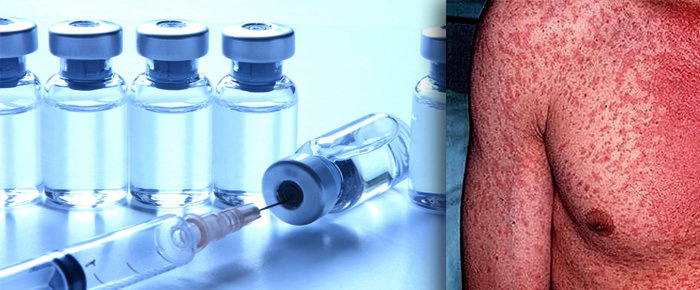
By Dr. Peter Kadile
The latest disease making headlines is no longer the Ebola virus, but the measles.
The measles outbreak in the United States is relatively small compared to underdeveloped countries, but is notable because the disease was declared eradicated in this country in 2000. The measles resurgence is linked to the growing number of unvaccinated or delayed vaccinated children. I don’t want to get in the middle of this hotly debated topic of anti vs pro vaccine, I simply want to provide information regarding the disease. I recommend parents do their research on measles and vaccination, so that they can make an educated and informed choice on whether to have their children vaccinated.
What is the measles?
The measles (also known as rubeola), is a highly contagious virus. (Since it’s a virus, antibiotics will not work against it). It is passed around through direct contact and through the air. Coughing and sneezing can disperse the virus into the air and can linger in the air up to two hours after an infected person leaves the room. According to a recent article in USA Today, each measles patient can infect up to 12-18 people!
What are the signs and symptoms of measles?
It’s worth noting that as a physician practicing and in training for over 20 years, I have never seen the measles. The disease has been so rare in this country due to vaccination, that I have never seen it in training and in my private practice.
Measles initially cause runny nose, cough, and red/watery eyes. Small white spots will develope inside the cheeks. A high fever will start 10 – 12 days after exposure and the fever can last up to a week. Several days after exposure, a rash will start on the face and neck. The rash will progress down to the feet over a 3 day period. The rash may last up to 6 days before it starts to fade.
Is measles fatal?
Most children will make a full recovery from the measles. There is no cure for the disease and death can happen. Most of the deaths due to measles are from the possible complications it can cause, such as; blindness, encephalitis (brain swelling), severe diarrhea, dehydration and pneumonia. The risk factors for the complications include; malnourished children, vitamin A deficiency, the immune compromised (people with HIV/AIDs, leukemia,…).
According to the World Health Organization, in 2013 there were 145,700 measles deaths worldwide.
How effective is the measles vaccine?
The vaccine first became available in 1963. It is now a 2 shot series, the first given at 12-15 months of age, the second at age 4-6. It is about 97% effective.











































